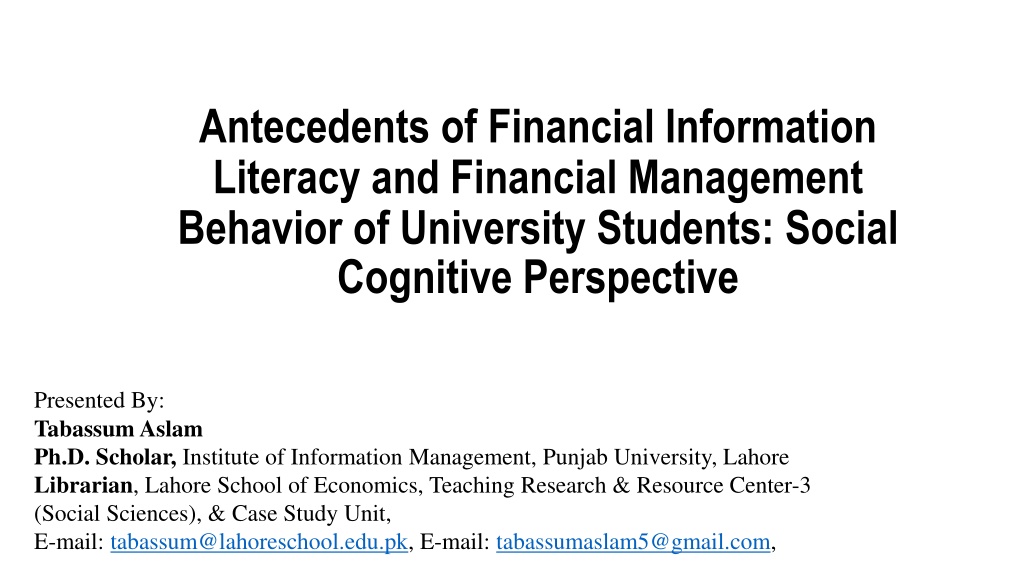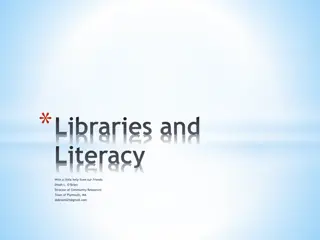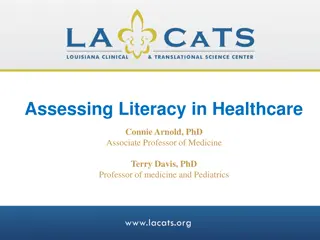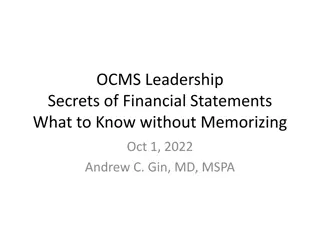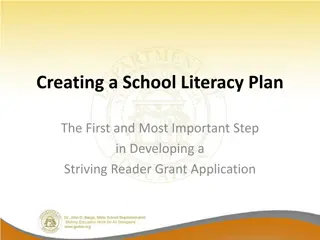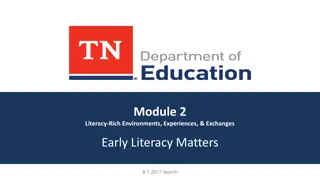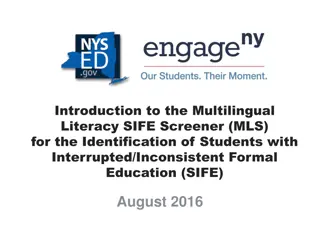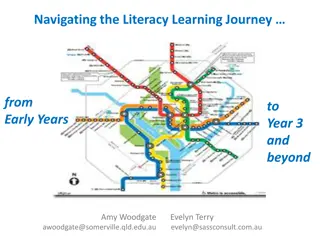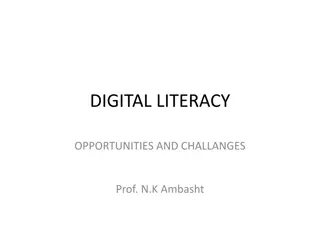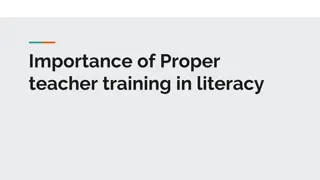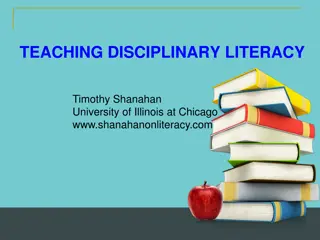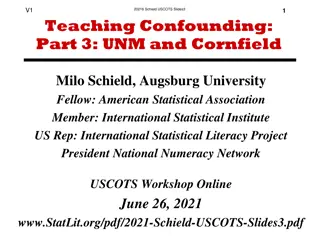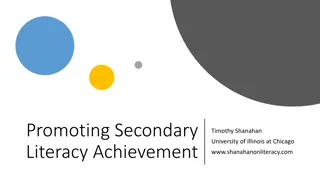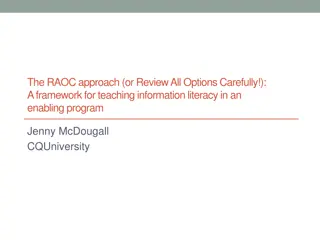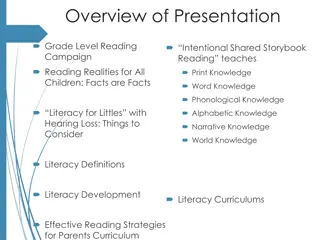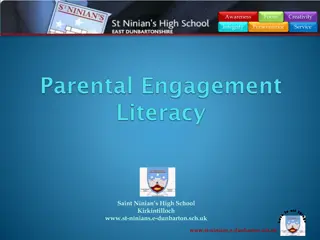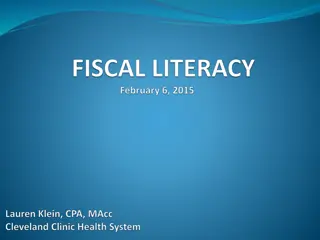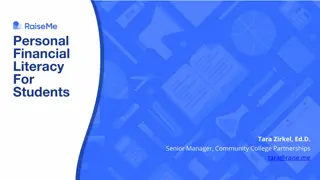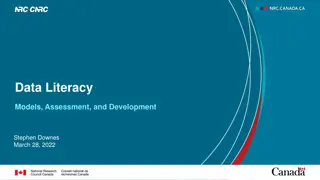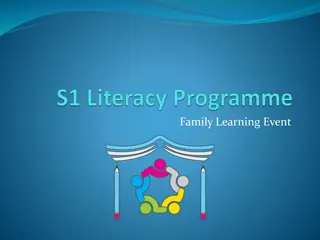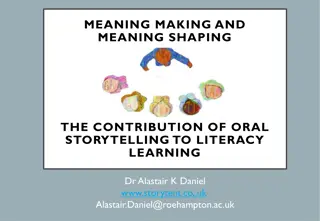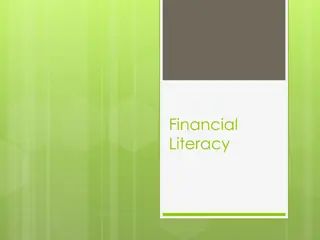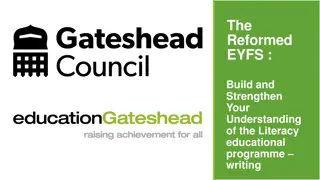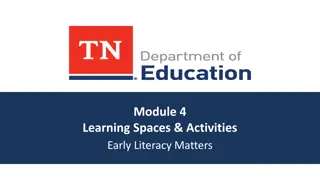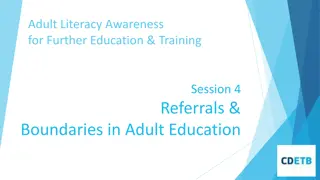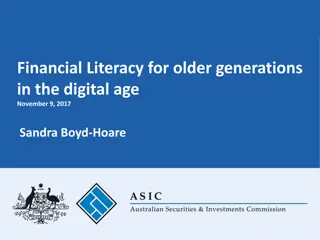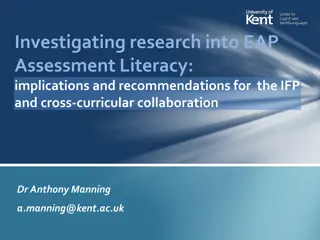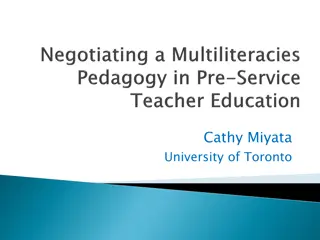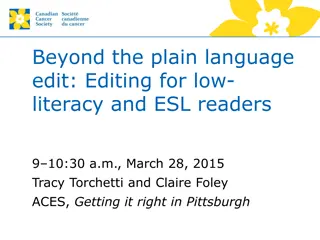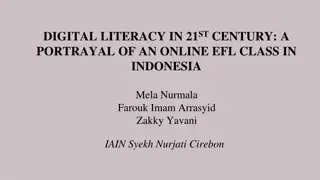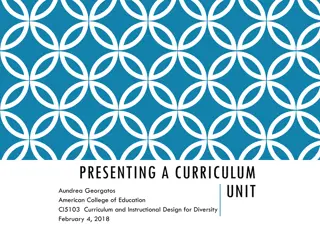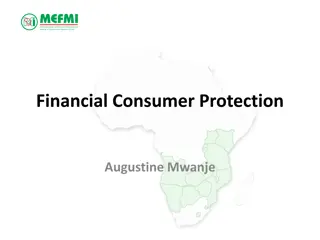Understanding Financial Information Literacy Among University Students
This study explores the financial information literacy (FIL) level of university students and how cognitive, behavioral, and environmental factors influence their learning using a social cognitive perspective. It addresses the evolving landscape of financial information, the need for appropriate financial education, and aims to contribute to the understanding of FIL competencies in emerging research areas. The research aims to uncover the FIL level among university students and investigate the factors affecting their financial literacy using social cognitive theory.
- Financial literacy
- University students
- Social cognitive perspective
- Financial education
- Cognitive factors
Uploaded on Oct 07, 2024 | 0 Views
Download Presentation

Please find below an Image/Link to download the presentation.
The content on the website is provided AS IS for your information and personal use only. It may not be sold, licensed, or shared on other websites without obtaining consent from the author. Download presentation by click this link. If you encounter any issues during the download, it is possible that the publisher has removed the file from their server.
E N D
Presentation Transcript
Antecedents of Financial Information Literacy and Financial Management Behavior of University Students: Social Cognitive Perspective Presented By: TabassumAslam Ph.D. Scholar, Institute of Information Management, Punjab University, Lahore Librarian, Lahore School of Economics, Teaching Research & Resource Center-3 (Social Sciences), & Case Study Unit, E-mail: tabassum@lahoreschool.edu.pk, E-mail: tabassumaslam5@gmail.com,
Financial Literacy? Problem Statement Aim & objectives Conceptualizing FIL Theoretical Framework Axiological Position Societal Relevance Expected Results Contribution/Implications Contents Contents RedMiLL2022: Aslam Tabassum 2
(Fox et al., 2005) As one s understanding and knowledge of financial concepts. Refers to the individual s ability to interpret and understand basic financial concepts and apply that financial knowledge to make informed decisions. (Remund, 2010). Financial Financial Literacy/ Literacy/ knowledge? knowledge? (Lusardi, Thaden & Rookey, 2005) Understanding the financial facts, concepts, principles, and technological tools, that are critical for sound financial decision making. The ability to use knowledge and skills to manage financial resources effectively for a lifetime of financial well-being . Hung et al., (2009, p. 4) Mason & Wilson, 2000). A person s ability to obtain, understand and evaluate the relevant information essential to make financial decisions, with a focus on the awareness of the likely financial consequences A combination of awareness, knowledge, skills, attitude, and behaviors necessary to make sound financial decisions and ultimately achieve individual financial wellbeing. OECD, 2000 RedMiLL2022: Aslam Tabassum 3
Constantly evolving complex financial information landscape To combat financial crisis Developing countries & financial illiteracy Need Appropriate financial education/training Understand their current FIL competencies Less explored, comparatively emerging new research area Social Issue/ Social Issue/ Problem Statement Problem Statement RedMiLL2022: Aslam Tabassum 4
Therefore, based on the above discussed scenario my doctoral aims Research Research Aim Aim To examine the financial information literacy (FIL) level of the university student. Also, it aims to understand how learning of financial information literacy among students is affected by cognitive, behavioral, and environmental factors through social cognitive theory (Bandura, 1986). RedMiLL2022: Aslam Tabassum 5
To examine the financial information literacy (FIL) level of university students. To examine the influence of personal, cognitive factors, effective factorsin predicting university students financial information literacy. Research Research Objectives Objectives To examine the influence of behavioral factors predicting university students financial information literacy. To examine the influence of environmental factors predicting university students financial information literacy. To determine the relationship between financial information literacy and the outcome variable (personal finance management behavior). RedMiLL2022: Aslam Tabassum 6
Conceptualizing Conceptualizing FIL FIL Information Literacy (information competencies, Identify, Plan & Gather, Evaluate, Manage, Use information) Financial Literacy [{(Financial knowledge (personal finance domain) and skills)] financial information literacy (FIL) as possession of knowledge, skills and competencies that people develop to seek, comprehend, evaluate and use financial information and concepts to make informed financial decisions to achieve ultimate financial wellbeing Plan and Gather Evaluate Identify Identify the need and context of financial information Ability to locate and access financial information Ability to compare and evaluate financial information sources Manage Ability to consider ethical & legal issues associated with financial data (privacy & security concerns) Ability to use financial information for financial decision making Use Ability to identify existing knowledge gaps (compare prices, interest rates) Financial Information Literacy RedMiLL2022: Aslam Tabassum 7
Theoretical Framework Theoretical Framework The current study will investigate financial information literacy, through broad theoretical perspectives such as social cognitive theory. Albert Bandura (Canadian-American psychologist) In 1960 social learning theory (SLT), also known as observation learning theory SLT believes that people can acquire new behaviors by observing and imitating others in a social context. It acknowledges the importance of observing, modeling, and imitating the behaviors, attitudes, and emotional reactions of others. Social Cognitive Theory 1896. RedMiLL2022: Aslam Tabassum 8
Social Cognitive Theoretical Perspective Upgraded version of SLT, Acknowledges the important of Self-efficacy Provide mechanism to understand the human behavior in a social context. The SCT offers the conceptual underpinning to look at the determinants and mechanisms of human thought, affect, and action (Bandura, 1986). Rooted in the notion of human agency, the social cognitive theory assumes that individuals can affect what they do and are influenced by their observations and relation with their external environments (Bandura, 1986). SCT assumes that human functioning is influenced by personal/ cognitive determinants, behavioral, and environmental determinants (Bandura, 1986, 1997). RedMiLL2022: Aslam Tabassum Source: Adapted from Social Foundations of Thought and Action: A Social Cognitive Theory (p.6) by (Bandura, 1986) 9
Demographic Demographic Age, Gender, Sector Level, CGPA, Education Level, Discipline of Study, Place of Residence, Work Experience, Owning a Bank Account, Socio Socio- -Economic Economic Parent s education level (father/mothers) Monthly Income of Parents (father/mother) Personal factors Personal factors Biological Factors Biological/Personnel Cognitive Effective factors Prior Knowledge/ Financial Prior Knowledge/ Financial Education Education Money Attitude Money Attitude Financial stress Financial stress Effective Factor Cognitive Factors RedMiLL2022: Aslam Tabassum 10
Financial Self-efficacy Financial self-efficacy is the level of confidence an individual has in his ability to access, use financial products or services, undertake a financial decision, and deal with a complex financial situation. Similarly, others describe financial self-efficacy as one s confidence in their ability to manage their finances (Glenn, 2018). Behavioral Behavioral Factor Factor RedMiLL2022: Aslam Tabassum 11
Financial Socialization Financial Socialization is a process that involves learning and advancing values, knowledge, norms, standards, attitudes, and behaviors that support the financial capability and well-being of the individual (Danes, 1994). This process can be done through the internal or external environment called the financial socialization agents. There are four major agents of financial socialization such as parents, education, friends, and the media. Environmental Environmental Factor Factor RedMiLL2022: Aslam Tabassum 12
Gaining an understanding of ones financial situation to make the most of your assets in daily life and to plan for one s future. It also refers to effective money management, to ensure short and long-term financial security by using its numerous forms (Patrisia & Fauziah, 2019). Xiao et al., (2014) defines financial behavior as any human behavior which is pertinent to money management. In the same way, Dowling et al., (2009) view the financial practice as a set of behaviors containing; financial planning, cash management, credit management, investments, insurance, and retirement planning, etc. Existing literature reveals that personal finance is highly related to financial literacy and financial behavior (Altfest, 2007; Tyson, 2010). Improved financial knowledge can encourage positive financial behavior among individuals (Hilgert, et al., 2003; Xiao, et al., 2014). RedMiLL2022: Aslam Tabassum Personnel Personnel Finance Finance Management Management Behavior Behavior 13
Present Studys Present Study s Theoretical Theoretical Framework Framework Grey Grey boxes boxes Shows the Shows the Application of Application of Social Cognitive Social Cognitive RedMiLL2022: Aslam Tabassum 14
Axiological Position Axiological Position Based on my study s nature of philosophy (Post-positivism) Post-positivism s axiological positioning relates with value free axiology, or the researcher s role is independent from the data (biased-free) RedMiLL2022: Aslam Tabassum 15
Societal Societal Relevance Relevance Improved financial decision making Effective use of money Increase financial inclusion Economic Growth How FIL contribute to society?/ How FIL is useful outside academia? Ensure wellbeing Reduce poverty Won t fall for fake schemes Increased confidence RedMiLL2022: Aslam Tabassum 16
The expected outcomes of the study will provide insights about students own perception of their current financial information skills and competencies Expected Expected Results Results Expected results will identify that how various personnel, behavioral and environmental factors contributes to the FIL level of the university students. Highlights their potential problematic areas. Expected results will identify the how FIL competencies effect university student s personal financial management behavior. RedMiLL2022: Aslam Tabassum 17
Contributions/Implication Contributions/Implication RedMiLL2022: Aslam Tabassum 18
Application of SC lens is missing in literature Act as baseline study Theoretical Theoretical Contributions Contributions Addition in the Literature of Information Science & Management Identify Potential Research Gaps RedMiLL2022: Aslam Tabassum 19
Raised awareness among students, at least, they can start to think about the importance of FIL. Policy makers can think about incorporating relevant curriculum (FIL) content in the general education curricula. Practical Practical Contributions Contributions Emerging role of information professionals Role of Libraries / professional organizations/ iSchools to conduct trainings/ seminars/ workshops Provide insights for Information Science researchers RedMiLL2022: Aslam Tabassum 20
Thankyou! Thankyou! RedMiLL2022: Aslam Tabassum 21
